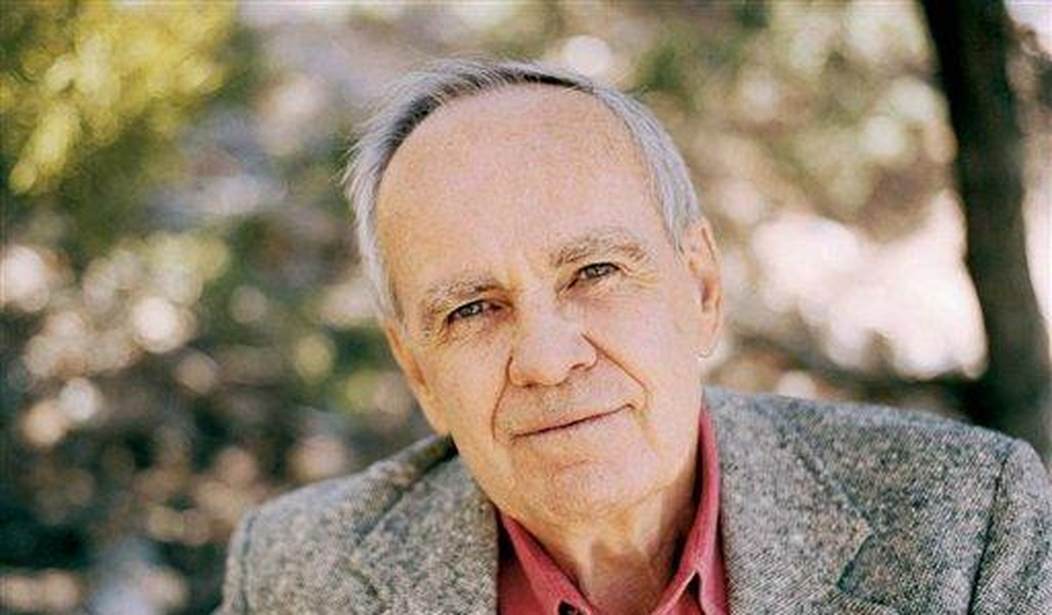Born one of six in Providence, Rhode Island, Charles “Cormac” McCarthy had a gift for using suspense and violence to open a window on the soul of our times. His family moved when he was young to Knoxville, where he took up many hobbies, but being a student wasn’t one of them. After graduating from Knoxville Catholic High School and a brief stint at the University of Tennessee, he joined the Air Force. He dedicated the rest of his life to writing, often in obscure poverty. This changed when he won a MacArthur fellowship in 1981. At the time, he was living in a Knoxville motel room, where they eventually located him so they could give him the “genius grant” prize money. He later moved to El Paso and eventually settled in Santa Fe, New Mexico, where he died at age 89.
He did much of his later writing in an office at the Santa Fe Institute, a scientific research center started by particle physicist Murray Gell-Mann. There he would sometimes volunteer to edit scientific articles and books while he worked at writing multiple books at a time on his manual Olivetti typewriter. A collector eventually paid almost a quarter million dollars for the typewriter. McCarthy then went out and bought another for $20.
He was first published in 1965, but his most noted recent books were “All the Pretty Horses,” “The Road” (for which he won a Pulitzer Prize), and “No Country for Old Men.” Like writer John Dos Passos, McCarthy had an ear for capturing spoken “American,” as well as the Spanish in which he was fluent.
“Here a year or two back me and Loretta went to a conference…I got set next to this woman…she kept talkin’ about the right wing this and the right wing that. I aint even sure what she meant by it…She kept on, kept on. Finally told me, said: I dont like the way this country is headed. I want my granddaughter to be able to have an abortion. And I said well mam I dont think you got any worries about the way the country is headed. The way I see it goin I dont have much doubt but what she’ll be able to have an abortion. I’m goin to say that not only will she be able to have an abortion, she’ll be able to have you put to sleep. Which pretty much ended the conversation.”
― No Country for Old Men”
At a certain point, McCarthy gave up drinking, saying, “If there is an occupational hazard to writing, it’s drinking.” He generally avoided the media. A 1992 profile in the New York Times Magazine said he “cuts his own hair, eats his meals off a hot plate or in cafeterias and does his wash at the Laundromat.” In the interview, he told Richard B. Woodward he thought Melville, Dostoevsky and Faulkner “good writers. ” Others ranked lower because they don’t “deal with issues of life and death.” As for Proust and Henry James, he said, “I don’t understand them. To me, that’s not literature. A lot of writers who are considered good I consider strange.”
He avoided publicity. “I don’t think it’s good for your head,” he told Oprah Winfrey, who listed his book “The Road” in her book club. “You spend a lot of time thinking about how to write a book; you probably shouldn’t be talking about it. You probably should be doing it.”
McCarthy never voted. “Poets shouldn’t vote,” he said. His work is often politically and morally ambiguous. He had a keen sense that human nature was fallen. “There’s no such thing as life without bloodshed. I think the notion that the species can be improved in some way, that everyone could live in harmony, is a really dangerous idea,” he told the New York Times Magazine.
Was his a world of dark pessimism, or did the darkness highlight a small glimmering light of hope? Readers can make up their own minds. Delibris.com, an excellent site that gives short reviews of books and grades them on their moral authenticity, wrote in their review of the book “All the Pretty Horses,” “The peculiarity of this novel is that the protagonists (or, rather, the author through the mouths of these characters) expose existential doubts such as: ‘Have you ever thought about death?’ ‘Do you believe that there is a heaven?’ ‘I like to think that God is here.’ ‘Do you ever pray?’ The ‘beautiful horses’ in the title is because horses play a very important role in this novel. McCarthy helps the reader appreciate the ‘loveliness’ of horses.”
Cormac McCarthy has gone to meet his maker. One hopes the questions and ambiguity that haunt his books have been resolved in the final chapter with something unusual: a happy ending.










Join the conversation as a VIP Member